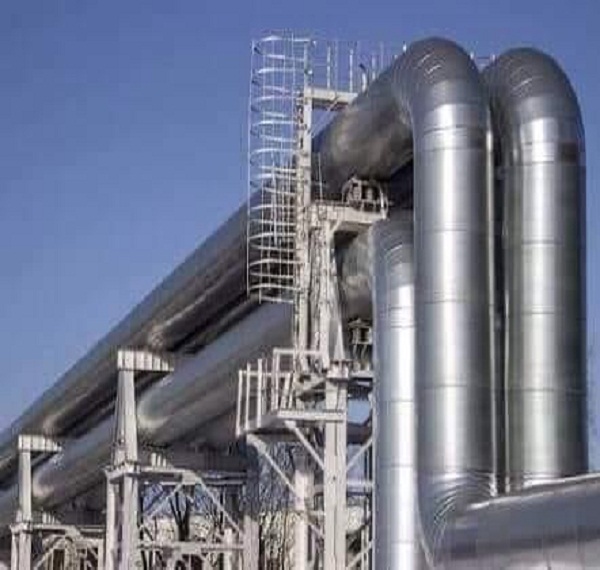The Federal Government (FG) kickstarts the $2.6 billion Ajaokuta-Kaduna-Kano (AKK) National Gas Pipeline Project next Tuesday to exploit her abundant gas reserves estimated to be around 203.16 trillion cubic feet (Tcf).
The AKK pipeline project aims to carry gas between the southern and northern parts of Nigeria, eventually extending extend to the North of Africa.
The project will be in two phases, totalling 614 kilometers (km) in length. Phase One is 303 kilometers (km) in length, and the second, 311km.
The Trans-Nigeria Gas Pipeline (TNGP) project, to be done on the basis of build and transfer public-private-partnership will transport 3,500 million metric standard cubic feet per day of dehydrated gas from several gas gathering projects located in southern Nigeria. The project will eventually reach North Africa in subsequent phases.
When pipelines cross borders, especially difficult terrains, tension-rife regions, especially in the atmosphere of distrust, considerations should be given to the possibility of inter-border encumbrances. In view of this, it suffices to examine what we have in terms of historical experience in matters of this nature.
As the government presses on with the AKK Gas Pipeline Project
While it is commendable to develop the domestic gas market, maintain domestic gas to power obligations and even earn foreign exchange from the hitherto wasted and flared gas produced for many years in the Nigerian oil fields, we cannot underestimate what can happen when pipelines cross borders between states and nations in view of the economic cum socio-political diversities of the different parties.
In view of the fact that much of the investment for the construction of the AKK pipeline started since 2013, one expects that long term fuel delivery contracts and a myriad of agreements to ensure smooth take off of operation would have been put in place. The owners and operators of the pipeline systems are thus expected to have contracts and some sorts of common legal frameworks to govern the obviously large but intended routine business transactions so that in the event of a disagreement, some tractable recourse to law or arbitration will therefore be available.
What does history tell us about problems that may arise from pipeline crossing borders?
For a pipeline to cross parts of a country, or worse still, another country, it may suffice to give thoughts to the transit fee chargeable by the host communities in addition to the fact that the host country in some cases will propose to “lift” some of the fuel crossing its territory at some preferential rate. To this end, when pipelines cross borders, as it is in this case, it may well have a potential to become part of the fabric of regional or even international conflicts of significant proportions. No doubt, much depends on the relationship between the parties involved.
When political passions are inflamed, or geopolitical calculations take precedence, existing agreements may soon become no more than a constantly shifting reality. Hence, the political climate between parties becomes an important factor. For example, in the Middle East, none of the great trans-national pipelines constructed in the last century is functioning today.
The Trans-Arabian pipeline code named “Tapline” was constructed to run from the Arabian oil fields, through Jordan and Syria en-route the Mediterranean coast. It was meant to be a shorter and cheaper route compared to the tankers used before then along the Arabian Peninsula. By 1975, the endless increase in transit fees by Syria soon marred the economic viability and therefore the continuous operation of the pipeline system.
A similar pipeline network constructed by Iraq Petroleum Company (IPC) from the Iraqi oil fields to the Mediterranean coast enjoyed similar fate from Syria. Needless to say, the operations of the Iraq Petroleum Company pipelines and the Trans-Arabian pipelines were repeatedly disrupted by the Syrians, who stood to benefit from the squabbles by many hundreds of millions of dollars through combined packages of “off take” rights, preferential tariffs and transit fees. In reaction, late Saddam Hussein, the then Iraqi leader, built alternative, longer and more expensive networks of pipelines through Turkey and Saudi Arabia to the international market.
This gave Syria an unfortunate reputation of a mere transit state that could easily be avoided with the attendant political tension that came with it. But in 1990, Saudi Arabia confiscated Iraqi pipeline network through its territory following the invasion of Kuwait by Iraq while the Kirkuk-Ceyhan pipeline on the Turkish Mediterranean coastsubsequently operated at an extremely reduced capacity following the damage by US bombing during the invasion of Iraq in 2003.
Careful consideration must also be given to the possibility of the dissolution of the member states of a nation along ethnic or political lines or cessation of a part thereof. In the case of the former Soviet Union, early after world war two, Soviet engineers constructed the largest integrated pipeline system in existence. This network supplied crude oil to all the Soviet Republics as well as providing about 100million tonnes of crude supplies to Europe. In building this system however, little regard was paid to the internal rancour between the individual Soviet Republics.
After the dissolution of the Soviet Union, each of the new republics laid claim to the pipelines passing through its territory. As a result, international boundaries were erected in the paths of these oil and gas pipelines many years after the systems had been completed. This has led to the unsavoury outcome that Russia’s gas and oil export to the west now cross into the territories of Ukraine and Belarus. This new configuration has led to endless squabbles over transit fees, fuel prices, interference in energy transmission and politically motivated blackmails.
The recent Russia-Ukraine confrontation is a fall out of this, capable of leading to an interruption of Europe-bound supplies in the middle of winter. Thus, the coinage of the security of energy supply problem as part of the energy trilemma in europe.
It is possible by virtue of location on the path of the pipeline network, for a nation to enjoy a monopoly as a transit country and therefore exploit the situation in the face of competing supplies of products from others with hers. For example, Russia acts as the transit country for hydrocarbon resources from Turkmenistan and Kazakhstan to get through to the west. As the production cost is far cheaper from these regions, Russia has since aimed at drawing maximum benefit from her role as the transit country by carefully maintaining a near monopoly over purchases of the cheaper products from these regions while exporting her own product at higher costs to Europe.
Russia’s Gazprom has used the Turkmen’s gas to support low domestic gas prices-vastly underpaying Turkmenistan for long periods while exporting her own natural gas to Europe at prices which are far higher than those paid to Turkmenistan and which, for Europeans, have continued to increase since 2001. In Kazakhstan, the Caspian Pipeline Consortium (CPC) oil pipeline is the only major direct outlet from the Chevron operated Tengiz field out to the sea. Hence, the CPC and the regional government have been charging exorbitant fees for ferrying Kazakh oil loading onto tankers at a nearby terminal on the Black sea coast.
Russian however insisted that the 28 million tonnes per year pipeline be directed through Moscow. This has paid off handsomely and the control element has worked effectively. Not only did Russian efforts delayed the construction of the pipeline when oil prices were low in the 1990s, they have also blocked the expansion of the pipeline to its eventual design capacity of 67 million tonnes.
Both Kazakhstan and Turkmenistan have learnt the cardinal rule of energy transmission which is valid for producers and consumers alike: the necessity to maintain alternative transmission routes. Suffice it is to mention that the laterly constructed Baku-Tblisi-Ceyhan oil pipeline and the Baku-Tblisi-Erzurum gas pipeline, which by-pass Russia, provide such alternative routes. This development has however been described as “Politically unacceptable” by the Russian Government. The Russian and Chinese governments block the idea to sell gas to europe via alternative routes.
In the operation of a trans-national gas pipeline of this nature, careful thoughts need to be given to the aspirations of locals from whose land gas is being exploited. Experience has shown that where multinational oil and gas companies from the west operate carelessly and pollute their environment, poor locals, who mostly benefit a little of what they think is owed to them from the central government in their country, resort to blowing of pipelines and vandalising structures to express their aggression. Hence, not all pipeline problems arise from inter-state rivalries. For example, in the north-eastern state of Assam in India, separatist forces regularly blow up regional oil pipelines. Also, in neighbouring Pakistan, Balochistans show their displeasure at government policies by regularly blowing up gas pipelines.
The guerrilla-style attacks on oil and gas installations in the Niger-delta region in Nigeria is a further testimony to what can result if locals from the region where oil and gas resources are being tapped suffer neglect or have little to show for the oil and gas wealth leaving their damaged environment and source of livelihood. Mostly, such locals, worldwide, have argued that the central government was giving too little to the region in return for exploiting their gas and mineral resources. By disrupting pipeline operations, insurgents have been able to deprive central government of large amount of income that could be used for development if ever. The unrest in the north eastern part of the country can get more “fuel to burn” because of this project.
It is imperative to state that international politics must also be considered as colonial masters tend to still hold some sort of grip over their former colonies. Also, powerful nations may influence decisions of parties to the trans-national pipeline network. Consider the case of the political tension between Iran and the USA. Iran, a country with the second largest proven gas reserves after Russia wishes to sell gas to the South Asian subcontinent. While constructing the Iran-Pakistan-India gas pipeline is economically attractive, overcoming the diplomatic resistance of the US has proved daunting. India has therefore exploited the rancour to derive enormous benefits in delaying the project as the US is offering nuclear fuels as an alternative source of energy to lure India away from it.
Needless to say, in retaliation to what is perceived to be the over domineering of the west, terrorist groups may capitalise on the fact that most borders in the developing nations are not properly monitored to unleash attacks that will prevent gas fuel reaching the intended regions in the west.
The conclusion of the matter is that pipelines do play a crucial role in transporting fuel across national, regional and national boundaries but some pipelines can be entangled in geo-political intrigues and machinations. These unwholesome possibilities and measures to mitigate their impacts must be given due consideration during the early life of the project.
Contributor: Engr Idowu Oyebanjo, MD/CEO of Idfon Power Engineering Consultants (IPEC) Limited.










